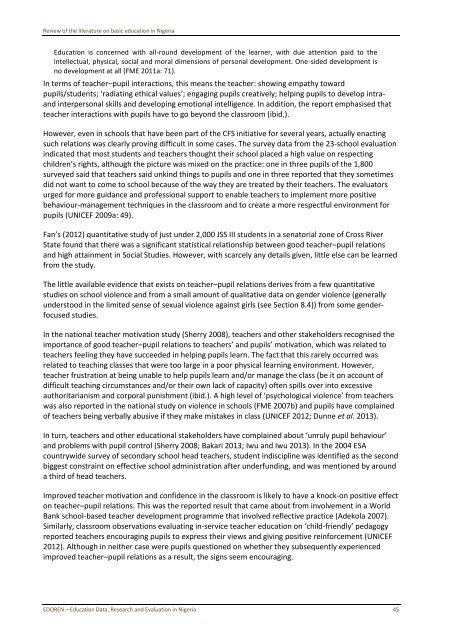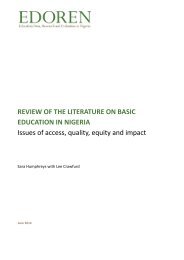Review <str<strong>on</strong>g>of</str<strong>on</strong>g> <str<strong>on</strong>g>the</str<strong>on</strong>g> <str<strong>on</strong>g>literature</str<strong>on</strong>g> <strong>on</strong> <strong>basic</strong> educati<strong>on</strong> <strong>in</strong> NigeriaEducati<strong>on</strong> is c<strong>on</strong>cerned with all-round development <str<strong>on</strong>g>of</str<strong>on</strong>g> <str<strong>on</strong>g>the</str<strong>on</strong>g> learner, with due attenti<strong>on</strong> paid to <str<strong>on</strong>g>the</str<strong>on</strong>g><strong>in</strong>tellectual, physical, social and moral dimensi<strong>on</strong>s <str<strong>on</strong>g>of</str<strong>on</strong>g> pers<strong>on</strong>al development. One-sided development isno development at all (FME 2011a: 71).In terms <str<strong>on</strong>g>of</str<strong>on</strong>g> teacher–pupil <strong>in</strong>teracti<strong>on</strong>s, this means <str<strong>on</strong>g>the</str<strong>on</strong>g> teacher: show<strong>in</strong>g empathy towardpupils/students; ‘radiat<strong>in</strong>g ethical values’; engag<strong>in</strong>g pupils creatively; help<strong>in</strong>g pupils to develop <strong>in</strong>traand<strong>in</strong>terpers<strong>on</strong>al skills and develop<strong>in</strong>g emoti<strong>on</strong>al <strong>in</strong>telligence. In additi<strong>on</strong>, <str<strong>on</strong>g>the</str<strong>on</strong>g> report emphasised thatteacher <strong>in</strong>teracti<strong>on</strong>s with pupils have to go bey<strong>on</strong>d <str<strong>on</strong>g>the</str<strong>on</strong>g> classroom (ibid.).However, even <strong>in</strong> schools that have been part <str<strong>on</strong>g>of</str<strong>on</strong>g> <str<strong>on</strong>g>the</str<strong>on</strong>g> CFS <strong>in</strong>itiative for several years, actually enact<strong>in</strong>gsuch relati<strong>on</strong>s was clearly prov<strong>in</strong>g difficult <strong>in</strong> some cases. The survey data from <str<strong>on</strong>g>the</str<strong>on</strong>g> 23-school evaluati<strong>on</strong><strong>in</strong>dicated that most students and teachers thought <str<strong>on</strong>g>the</str<strong>on</strong>g>ir school placed a high value <strong>on</strong> respect<strong>in</strong>gchildren’s rights, although <str<strong>on</strong>g>the</str<strong>on</strong>g> picture was mixed <strong>on</strong> <str<strong>on</strong>g>the</str<strong>on</strong>g> practice: <strong>on</strong>e <strong>in</strong> three pupils <str<strong>on</strong>g>of</str<strong>on</strong>g> <str<strong>on</strong>g>the</str<strong>on</strong>g> 1,800surveyed said that teachers said unk<strong>in</strong>d th<strong>in</strong>gs to pupils and <strong>on</strong>e <strong>in</strong> three reported that <str<strong>on</strong>g>the</str<strong>on</strong>g>y sometimesdid not want to come to school because <str<strong>on</strong>g>of</str<strong>on</strong>g> <str<strong>on</strong>g>the</str<strong>on</strong>g> way <str<strong>on</strong>g>the</str<strong>on</strong>g>y are treated by <str<strong>on</strong>g>the</str<strong>on</strong>g>ir teachers. The evaluatorsurged for more guidance and pr<str<strong>on</strong>g>of</str<strong>on</strong>g>essi<strong>on</strong>al support to enable teachers to implement more positivebehaviour-management techniques <strong>in</strong> <str<strong>on</strong>g>the</str<strong>on</strong>g> classroom and to create a more respectful envir<strong>on</strong>ment forpupils (UNICEF 2009a: 49).Fan’s (2012) quantitative study <str<strong>on</strong>g>of</str<strong>on</strong>g> just under 2,000 JSS III students <strong>in</strong> a senatorial z<strong>on</strong>e <str<strong>on</strong>g>of</str<strong>on</strong>g> Cross RiverState found that <str<strong>on</strong>g>the</str<strong>on</strong>g>re was a significant statistical relati<strong>on</strong>ship between good teacher–pupil relati<strong>on</strong>sand high atta<strong>in</strong>ment <strong>in</strong> Social Studies. However, with scarcely any details given, little else can be learnedfrom <str<strong>on</strong>g>the</str<strong>on</strong>g> study.The little available evidence that exists <strong>on</strong> teacher–pupil relati<strong>on</strong>s derives from a few quantitativestudies <strong>on</strong> school violence and from a small amount <str<strong>on</strong>g>of</str<strong>on</strong>g> qualitative data <strong>on</strong> gender violence (generallyunderstood <strong>in</strong> <str<strong>on</strong>g>the</str<strong>on</strong>g> limited sense <str<strong>on</strong>g>of</str<strong>on</strong>g> sexual violence aga<strong>in</strong>st girls (see Secti<strong>on</strong> 8.4)) from some genderfocusedstudies.In <str<strong>on</strong>g>the</str<strong>on</strong>g> nati<strong>on</strong>al teacher motivati<strong>on</strong> study (Sherry 2008), teachers and o<str<strong>on</strong>g>the</str<strong>on</strong>g>r stakeholders recognised <str<strong>on</strong>g>the</str<strong>on</strong>g>importance <str<strong>on</strong>g>of</str<strong>on</strong>g> good teacher–pupil relati<strong>on</strong>s to teachers’ and pupils’ motivati<strong>on</strong>, which was related toteachers feel<strong>in</strong>g <str<strong>on</strong>g>the</str<strong>on</strong>g>y have succeeded <strong>in</strong> help<strong>in</strong>g pupils learn. The fact that this rarely occurred wasrelated to teach<strong>in</strong>g classes that were too large <strong>in</strong> a poor physical learn<strong>in</strong>g envir<strong>on</strong>ment. However,teacher frustrati<strong>on</strong> at be<strong>in</strong>g unable to help pupils learn and/or manage <str<strong>on</strong>g>the</str<strong>on</strong>g> class (be it <strong>on</strong> account <str<strong>on</strong>g>of</str<strong>on</strong>g>difficult teach<strong>in</strong>g circumstances and/or <str<strong>on</strong>g>the</str<strong>on</strong>g>ir own lack <str<strong>on</strong>g>of</str<strong>on</strong>g> capacity) <str<strong>on</strong>g>of</str<strong>on</strong>g>ten spills over <strong>in</strong>to excessiveauthoritarianism and corporal punishment (ibid.). A high level <str<strong>on</strong>g>of</str<strong>on</strong>g> ‘psychological violence’ from teacherswas also reported <strong>in</strong> <str<strong>on</strong>g>the</str<strong>on</strong>g> nati<strong>on</strong>al study <strong>on</strong> violence <strong>in</strong> schools (FME 2007b) and pupils have compla<strong>in</strong>ed<str<strong>on</strong>g>of</str<strong>on</strong>g> teachers be<strong>in</strong>g verbally abusive if <str<strong>on</strong>g>the</str<strong>on</strong>g>y make mistakes <strong>in</strong> class (UNICEF 2012; Dunne et al. 2013).In turn, teachers and o<str<strong>on</strong>g>the</str<strong>on</strong>g>r educati<strong>on</strong>al stakeholders have compla<strong>in</strong>ed about ‘unruly pupil behaviour’and problems with pupil c<strong>on</strong>trol (Sherry 2008; Bakari 2013; Iwu and Iwu 2013). In <str<strong>on</strong>g>the</str<strong>on</strong>g> 2004 ESAcountrywide survey <str<strong>on</strong>g>of</str<strong>on</strong>g> sec<strong>on</strong>dary school head teachers, student <strong>in</strong>discipl<strong>in</strong>e was identified as <str<strong>on</strong>g>the</str<strong>on</strong>g> sec<strong>on</strong>dbiggest c<strong>on</strong>stra<strong>in</strong>t <strong>on</strong> effective school adm<strong>in</strong>istrati<strong>on</strong> after underfund<strong>in</strong>g, and was menti<strong>on</strong>ed by arounda third <str<strong>on</strong>g>of</str<strong>on</strong>g> head teachers.Improved teacher motivati<strong>on</strong> and c<strong>on</strong>fidence <strong>in</strong> <str<strong>on</strong>g>the</str<strong>on</strong>g> classroom is likely to have a knock-<strong>on</strong> positive effect<strong>on</strong> teacher–pupil relati<strong>on</strong>s. This was <str<strong>on</strong>g>the</str<strong>on</strong>g> reported result that came about from <strong>in</strong>volvement <strong>in</strong> a WorldBank school-based teacher development programme that <strong>in</strong>volved reflective practice (Adekola 2007).Similarly, classroom observati<strong>on</strong>s evaluat<strong>in</strong>g <strong>in</strong>-service teacher educati<strong>on</strong> <strong>on</strong> ‘child-friendly’ pedagogyreported teachers encourag<strong>in</strong>g pupils to express <str<strong>on</strong>g>the</str<strong>on</strong>g>ir views and giv<strong>in</strong>g positive re<strong>in</strong>forcement (UNICEF2012). Although <strong>in</strong> nei<str<strong>on</strong>g>the</str<strong>on</strong>g>r case were pupils questi<strong>on</strong>ed <strong>on</strong> whe<str<strong>on</strong>g>the</str<strong>on</strong>g>r <str<strong>on</strong>g>the</str<strong>on</strong>g>y subsequently experiencedimproved teacher–pupil relati<strong>on</strong>s as a result, <str<strong>on</strong>g>the</str<strong>on</strong>g> signs seem encourag<strong>in</strong>g.EDOREN – Educati<strong>on</strong> Data, Research and Evaluati<strong>on</strong> <strong>in</strong> Nigeria 45
Review <str<strong>on</strong>g>of</str<strong>on</strong>g> <str<strong>on</strong>g>the</str<strong>on</strong>g> <str<strong>on</strong>g>literature</str<strong>on</strong>g> <strong>on</strong> <strong>basic</strong> educati<strong>on</strong> <strong>in</strong> Nigeria4.7 Pupil–pupil relati<strong>on</strong>sThere is no available research that has focused exclusively <strong>on</strong> pupil–pupil relati<strong>on</strong>s <strong>in</strong> class, althoughDunne et al.’s (2013) Adamawa-based study at primary level and Bakari’s (2013) study <strong>in</strong> Kogi State atsec<strong>on</strong>dary level present qualitative data highlight<strong>in</strong>g some <str<strong>on</strong>g>of</str<strong>on</strong>g> <str<strong>on</strong>g>the</str<strong>on</strong>g> issues.In <str<strong>on</strong>g>the</str<strong>on</strong>g> Adamawa study, teacher <strong>in</strong>terviews and classroom observati<strong>on</strong>s <str<strong>on</strong>g>of</str<strong>on</strong>g>ten suggested that pupilsgenerally got <strong>on</strong> well toge<str<strong>on</strong>g>the</str<strong>on</strong>g>r <strong>in</strong> class, and some amicable cross-gender <strong>in</strong>teracti<strong>on</strong>s were witnessed(Dunne et al. 2013). Even so, girls more <str<strong>on</strong>g>of</str<strong>on</strong>g>ten <strong>in</strong>teracted with o<str<strong>on</strong>g>the</str<strong>on</strong>g>r girls and boys with boys; forexample, borrow<strong>in</strong>g pencils am<strong>on</strong>g students <str<strong>on</strong>g>of</str<strong>on</strong>g> <str<strong>on</strong>g>the</str<strong>on</strong>g> same gender, even when seat<strong>in</strong>g was mixed. In bothstudies, however, pupils preferred to sit <strong>in</strong> gender-segregated blocks <strong>in</strong> class. This was usually leftunchallenged by teachers and ascribed to biology (e.g. <str<strong>on</strong>g>the</str<strong>on</strong>g> presumed <strong>in</strong>nate shyness <str<strong>on</strong>g>of</str<strong>on</strong>g> girls or <str<strong>on</strong>g>the</str<strong>on</strong>g>desire for girls to sit apart dur<strong>in</strong>g menstruati<strong>on</strong>) and/or religious culture (Bakari 2013; Dunne et al.2013).Pupils <strong>in</strong>terviewed <strong>in</strong> <str<strong>on</strong>g>the</str<strong>on</strong>g> Adamawa study were less positive about peer relati<strong>on</strong>s than teachers were(Dunne et al. 2013). In all six schools, girls compla<strong>in</strong>ed <str<strong>on</strong>g>of</str<strong>on</strong>g> (some) boys physically and/or verballyharass<strong>in</strong>g, bully<strong>in</strong>g or teas<strong>in</strong>g <str<strong>on</strong>g>the</str<strong>on</strong>g>m. Some boys also compla<strong>in</strong>ed <str<strong>on</strong>g>of</str<strong>on</strong>g> be<strong>in</strong>g teased by (some) girls and/oro<str<strong>on</strong>g>the</str<strong>on</strong>g>r boys, especially for not do<strong>in</strong>g as well academically as girls. Over-age pupils were also identified asa group pr<strong>on</strong>e to bully<strong>in</strong>g and be<strong>in</strong>g bullied, so tended to self-segregate <str<strong>on</strong>g>of</str<strong>on</strong>g>ten at <str<strong>on</strong>g>the</str<strong>on</strong>g> back <str<strong>on</strong>g>of</str<strong>on</strong>g> <str<strong>on</strong>g>the</str<strong>on</strong>g> class,probably to protect <str<strong>on</strong>g>the</str<strong>on</strong>g>mselves from be<strong>in</strong>g teased by o<str<strong>on</strong>g>the</str<strong>on</strong>g>r pupils (ibid.).Boys also compla<strong>in</strong>ed about o<str<strong>on</strong>g>the</str<strong>on</strong>g>r boys fight<strong>in</strong>g <strong>in</strong> class, which was also observed. ‘Teas<strong>in</strong>g’, for sitt<strong>in</strong>gnext to a member <str<strong>on</strong>g>of</str<strong>on</strong>g> <str<strong>on</strong>g>the</str<strong>on</strong>g> ‘opposite sex’, for not answer<strong>in</strong>g a questi<strong>on</strong> <strong>in</strong> class or for do<strong>in</strong>g badly <strong>in</strong> tests,could reportedly result <strong>in</strong> feel<strong>in</strong>gs <str<strong>on</strong>g>of</str<strong>on</strong>g> shame, n<strong>on</strong>-participati<strong>on</strong> <strong>in</strong> class or even pupil absenteeism ordropout (ibid.). There have been similar f<strong>in</strong>d<strong>in</strong>gs <strong>in</strong> studies elsewhere <strong>in</strong> SSA (see Dunne et al. 2006), butthis is clearly an area that needs fur<str<strong>on</strong>g>the</str<strong>on</strong>g>r research.Pupil feedback for <str<strong>on</strong>g>the</str<strong>on</strong>g> end-<str<strong>on</strong>g>of</str<strong>on</strong>g>-project report for GEP II noted that <str<strong>on</strong>g>the</str<strong>on</strong>g>y do not like disrupti<strong>on</strong> from o<str<strong>on</strong>g>the</str<strong>on</strong>g>rpupils <strong>in</strong> class, <strong>in</strong>clud<strong>in</strong>g shout<strong>in</strong>g, horseplay or pupils be<strong>in</strong>g abusive (UNICEF 2012).O<str<strong>on</strong>g>the</str<strong>on</strong>g>r studies describ<strong>in</strong>g patterns <str<strong>on</strong>g>of</str<strong>on</strong>g> school bully<strong>in</strong>g (e.g. Egbochuku 2007; FME 2007b; Adefunke 2010)are c<strong>on</strong>sidered more fully <strong>in</strong> Secti<strong>on</strong> 12.3.2, s<strong>in</strong>ce <str<strong>on</strong>g>the</str<strong>on</strong>g>y discuss bully<strong>in</strong>g <strong>in</strong>side and outside <str<strong>on</strong>g>the</str<strong>on</strong>g> classroom.4.8 Issues aris<strong>in</strong>g and gaps <strong>in</strong> <str<strong>on</strong>g>the</str<strong>on</strong>g> evidenceGiven that teacher–pupil and pupil–pupil <strong>in</strong>teracti<strong>on</strong>s form <str<strong>on</strong>g>the</str<strong>on</strong>g> crux <str<strong>on</strong>g>of</str<strong>on</strong>g> <str<strong>on</strong>g>the</str<strong>on</strong>g> teach<strong>in</strong>g/learn<strong>in</strong>g nexus, it issurpris<strong>in</strong>g how little <strong>in</strong>-depth classroom research is available <strong>on</strong> <str<strong>on</strong>g>the</str<strong>on</strong>g> processes <str<strong>on</strong>g>of</str<strong>on</strong>g> teach<strong>in</strong>g and learn<strong>in</strong>g.Informati<strong>on</strong> is also lack<strong>in</strong>g <strong>on</strong> <str<strong>on</strong>g>the</str<strong>on</strong>g> specific <strong>in</strong>teracti<strong>on</strong>s that pupils f<strong>in</strong>d most helpful <strong>in</strong> learn<strong>in</strong>g.Teachers clearly need more support and guidance <strong>in</strong> <str<strong>on</strong>g>the</str<strong>on</strong>g> area <str<strong>on</strong>g>of</str<strong>on</strong>g> assessment, both formative andsummative. If teachers are unable to diagnose pupil difficulties, <str<strong>on</strong>g>the</str<strong>on</strong>g>y will be unable to help pupilsovercome <str<strong>on</strong>g>the</str<strong>on</strong>g>se difficulties. Related to this is <str<strong>on</strong>g>the</str<strong>on</strong>g> issue <str<strong>on</strong>g>of</str<strong>on</strong>g> record-keep<strong>in</strong>g; especially with such largeclasses, teachers need support <strong>in</strong> learn<strong>in</strong>g how to keep records that allow <str<strong>on</strong>g>the</str<strong>on</strong>g>m to m<strong>on</strong>itor progress.An<str<strong>on</strong>g>the</str<strong>on</strong>g>r absence is empirical classroom-based research across <str<strong>on</strong>g>the</str<strong>on</strong>g> various subjects that describes <str<strong>on</strong>g>the</str<strong>on</strong>g>curriculum <strong>in</strong> acti<strong>on</strong> at both primary and JSS level.More classroom research is needed <strong>in</strong> Nigeria that provides a more nuanced account <str<strong>on</strong>g>of</str<strong>on</strong>g> classroomprocesses. To achieve this, <strong>on</strong>e-<str<strong>on</strong>g>of</str<strong>on</strong>g>f observati<strong>on</strong>s <str<strong>on</strong>g>of</str<strong>on</strong>g> a class should be m<strong>in</strong>imised <strong>in</strong> order to avoid <str<strong>on</strong>g>the</str<strong>on</strong>g>‘special less<strong>on</strong>’ and magnified observer effects, which are acknowledged as potential limitati<strong>on</strong>s <strong>in</strong> somestudies (e.g. Hardman et al. 2008; Dunne et al. 2013).EDOREN – Educati<strong>on</strong> Data, Research and Evaluati<strong>on</strong> <strong>in</strong> Nigeria 46
- Page 1 and 2:
REVIEW OF THE LITERATURE ON BASICED
- Page 3 and 4:
Review of
- Page 5 and 6:
Review of
- Page 7 and 8:
Review of
- Page 9 and 10:
Review of
- Page 11 and 12:
Review of
- Page 13 and 14:
Review of
- Page 15 and 16:
Review of
- Page 17 and 18:
Review of
- Page 19 and 20:
Review of
- Page 21 and 22: Review of
- Page 23 and 24: Review of
- Page 25 and 26: Review of
- Page 27 and 28: Review of
- Page 29 and 30: Review of
- Page 31 and 32: Review of
- Page 33 and 34: Review of
- Page 35 and 36: Review of
- Page 37 and 38: Review of
- Page 39 and 40: Review of
- Page 41 and 42: Review of
- Page 43 and 44: Review of
- Page 45 and 46: Review of
- Page 47 and 48: Review of
- Page 49 and 50: Review of
- Page 51 and 52: Review of
- Page 53 and 54: Review of
- Page 55 and 56: Review of
- Page 57 and 58: Review of
- Page 59 and 60: Review of
- Page 61 and 62: Review of
- Page 63 and 64: Review of
- Page 65 and 66: Review of
- Page 67 and 68: Review of
- Page 69 and 70: Review of
- Page 71: Review of
- Page 75 and 76: Review of
- Page 77 and 78: Review of
- Page 79 and 80: Review of
- Page 81 and 82: Review of
- Page 83 and 84: Review of
- Page 85 and 86: Review of
- Page 87 and 88: Review of
- Page 89 and 90: Review of
- Page 91 and 92: Review of
- Page 93 and 94: Review of
- Page 95 and 96: Review of
- Page 97 and 98: Review of
- Page 99 and 100: Review of
- Page 101 and 102: Review of
- Page 103 and 104: Review of
- Page 105 and 106: Review of
- Page 107 and 108: Review of
- Page 109 and 110: Review of
- Page 111 and 112: Review of
- Page 113 and 114: Review of
- Page 115 and 116: Review of
- Page 117 and 118: Review of
- Page 119 and 120: Review of
- Page 121 and 122: Review of
- Page 123 and 124:
Review of
- Page 125 and 126:
Review of
- Page 127 and 128:
Review of
- Page 129 and 130:
Review of
- Page 131 and 132:
Review of
- Page 133 and 134:
Review of
- Page 135 and 136:
Review of
- Page 137 and 138:
Review of
- Page 139 and 140:
Review of
- Page 141 and 142:
Review of
- Page 143 and 144:
Review of
- Page 145 and 146:
Review of
- Page 147 and 148:
Review of
- Page 149 and 150:
Review of
- Page 151 and 152:
Review of
- Page 153 and 154:
Review of
- Page 155 and 156:
Review of
- Page 157 and 158:
Review of
- Page 159 and 160:
Review of
- Page 161 and 162:
Review of
- Page 163 and 164:
Review of
- Page 165 and 166:
Review of
- Page 167 and 168:
Review of
- Page 169 and 170:
Review of
- Page 171 and 172:
Review of
- Page 173 and 174:
Review of
- Page 175 and 176:
Review of
- Page 177 and 178:
Review of
- Page 179 and 180:
Review of
- Page 181 and 182:
Review of
- Page 183 and 184:
Review of
- Page 185 and 186:
Review of
- Page 187 and 188:
Review of
- Page 189 and 190:
Review of
- Page 191 and 192:
Review of
- Page 193 and 194:
Review of
- Page 195 and 196:
Review of
- Page 197 and 198:
Review of
- Page 199 and 200:
Review of
- Page 201 and 202:
Review of
- Page 203 and 204:
Review of
- Page 205 and 206:
Review of
- Page 207 and 208:
Review of
- Page 209 and 210:
Review of



